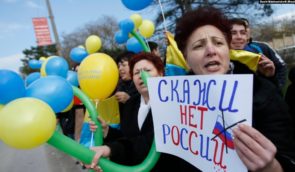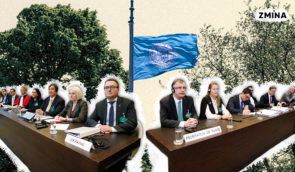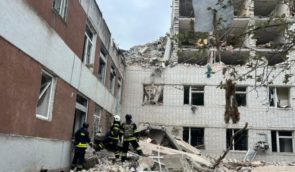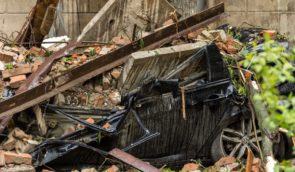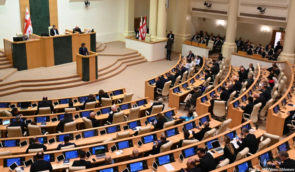Ukraine Has its Head in the Sand on Rome Statute
On January 2, the National Security and Defense Council of Ukraine (NSDC) proclaimed that Ukraine must not ratify the Statute of the International Criminal Court (ICC) until Russia does the same.
“ICC has jurisdiction only over the states that have ratified the Rome Statute … The prosecution of the Russian authorities, soldiers, and leadership through the International Criminal Court is impossible because Russia is not a party to the Rome statute,” the Center on Information and Analysis of the National Security Council said in a statement based on the conclusions of leader Volodimir Polevoy.
The representative of the National Security Council believes that the ratification of the Statute “will be used by Russian propaganda and for diplomatic pressure on our country.”
The National Security Council makes reference to the experience of the Russian-Georgian war. “The International Criminal Court is currently reviewing over 3,000 applications from Russians who received Russian citizenship in South Ossetia and allegedly suffered damage from the actions of Georgian authorities. That is, Russians are accusing the Georgian side, whose actions are being investigated by the court, and not vice versa. The prosecution of the Russian authorities, soldiers, and leadership through the International Criminal Court is impossible because Russia is not a party to the Rome Statute. Of course Russia, who is deliberately destabilizing the situation in countries that are ‘in the scope’ of its national interests, is not planning to ratify this document,” states the Center on Information and Analysis of the NSDC.
Meanwhile, Yuriy Lutsenko, the chairman of the Petro Poroshenko Bloc, noted in the Parliament’s conciliatory council that the president’s faction would not support the signing of the Rome Statute.
“Our faction will not support the signing of the Rome Statute, which can be used against us in this war situation. It can be distracting to our soldiers and the rest of the country in general, for them to be concerned with completely predictable Russian accusations in a court that Russia is not even planning to join. We deem this wrong and not symmetrical. However, we agree with the idea of ad hoc appeals, such as what we did in regards to the shootings in Maidan, and with applying to recognize the ICC’s jurisdiction over crimes against humanity in Ukrainian Donbass,” said Lutsenko.
Human Rights Information Center asked Ukrainian human rights advocates to comment on the authorities’ refusal to ratify the Rome Statute.
Volodimir Yavorskiy, Human Rights Advocate
Firstly, the International Criminal Court investigates cases in the countries that have ratified the Rome Statute. Therefore, if Ukraine ratified the statute, any international crimes committed on our territory could be investigated, regardless of whether Russia has ratified it or not. Secondly, its ratification is obligatory under the Ukraine-EU Association Agreement, and cannot be contingent on the ratification by Russia.
NSDC statements about Russia potentially using ICC for propaganda are like saying that we are not interested in criminals being in prison because they are using it for their own propaganda. Russia uses anything for propaganda, and makes things up when there’s nothing to use. It is important for us that the criminals are behind bars, not holding government offices and giving interviews. That is, we need to think about justice, not PR.
If Ukraine does not fulfill the Association Agreement, the consequences will primarily be on the political level, because Europe does not cooperate with those who do not respect agreements.
It would not be easy to reach the war criminals right away, but I think it would be possible over time. The completion of an investigation and the announcement of certain persons on the wanted list would be very serious in its own right.
It is also feasible to recognize the Court’s jurisdiction for 2014-2015 together with the ratification of the statute. All in all, the NSDC’s logic is not clear: don’t ratify the statute, but submit individual declarations instead?
Olexandra Matviichuk, Head of the Center for Civil Liberties
The NSDC needs to carefully examine the Georgian experience. It shows that, despite Russia’s actions, such as presenting materials to the ICC and attempting to distort the facts, this is nearly the only tool Georgia possesses to bring international criminal liability to specific individuals responsible for international crimes during the war.
Ukraine’s case is similar. Yes, we know that Russia is documenting and preparing piles of materials for the International Criminal Court. We know that the Russian authoritarian regime falsifies facts and presents them as it suits them. But this should not be a reason for Ukraine not to fulfill its direct obligation and not protect its citizens.
If Ukraine is unable to carry out an investigation in the occupied territories and bring the perpetrators to justice, it must use the tools that are suitable for this purpose. It should not make up excuses like how the state authorities are unable to properly collect and document the international crimes committed by pro-Russian organized armed units and Russian occupying power in Crimea.
I would advise the NSDC not to urge MPs to openly sabotage the implementation of international commitments, which looks very strange in the eyes of the world, but to direct their constructive energy in order to create a coordinating center at the Security Service of Ukraine (SBU) that gathers representatives of the Defense Ministry, Prosecutor General’s Office, Military Prosecutor’s Office, Ministry of Internal Affairs and other bodies, and properly document these crimes, which is what non-governmental organizations are now trying to do. Then this issue will resolve itself naturally.
Ukraine’s direct constitutional duty is to protect its citizens.
Russian propaganda will certainly use Ukraine’s reluctance to conduct international investigations in its favor. Instead of speaking out, displaying the crimes to the world, and calling for international investigations where it cannot hold its own, Ukraine takes the quiet, diffident standpoint. It not only looks confusing, but also makes us look like the guilty party.
In relation to the NSDC’s statement that “the prosecution of the Russian authorities, soldiers, and leadership through the International Criminal Court is impossible, because Russia is not a party to the Rome statute” I advise NSDC members to read the Rome Statute, Article 12 to be specific.
Roman Romanov, Rule of Law Program Director at the International Renaissance Foundation
Firstly, I do not know how they plan to stop Russian propaganda by ratifying the Rome Statute, because there is so much of it already that there can hardly be any more.
Secondly, I think one should not underestimate the work of lawyers, that is, there is nothing predetermined, but lawyers should work to ensure there are legal mechanisms.
Thirdly, I believe that synchronous ratification of the Rome Statute with Russia does not make any sense, because it is important for us to recognize the territorial jurisdiction of the ICC. Since we are talking about war crimes committed in the territory of Ukraine, the jurisdiction of the Court will depend solely on whether Ukraine recognizes it. The Ukrainian military is not committing any crimes in the territory of Russia, as far as I know. Therefore, if the crimes are committed in the territory of Ukraine by Russian citizens, then the ICC’s mechanisms can be used for prosecution. I do not understand why Ukraine does not want to take advantage of it. It seems to me that the response to propaganda must be proper documentation of war crimes that occur.
I am very concerned about NSDC’s statement, because it could mean that Ukraine doesn’t conduct proper documentation. This should be important regardless of circumstances. If war crimes are not being documented, it means promoting lawlessness and abetting future crimes.
Refusal to ratify would mean that we would lose the trust of the EU, our main partner on the continent.
Regarding the crimes of the Russian-Georgian war, a preliminary investigation has been recently completed. It indeed lasted six years, but, first of all, there have been no negative experiences, as the ICC has just fully begun proceedings on events in Georgia. Secondly, one cannot measure facts in quantity of applications or in paper tons. It is crucial to examine the quality of evidence and materials submitted, and this is directly related to the documentation that must be provided by the Ukrainian side.
Arkadiy Bushchenko, Executive Director of the Ukrainian Helsinki Human Rights Union
NSDC’s vision is completely wrong. The ratification of the statute has been on the agenda for twelve to thirteen years. This document is not only important in times of military operations, it is important for the health of the state.
As of Russia documenting and whether there exist those facts that Russian authorities claim to be crimes, this is precisely what the Court is for.
No one is stopping Ukraine from introducing a system of documentation of what is happening in the East. It has been urged to do this for a long time, but nothing happens.
The Prosecutor’s Office gladly investigates cases of desertion and other violations, spending enormous resources on it. But, it does nothing to document human rights violations and war crimes committed every day in the East of Ukraine.
Inability to hold meaningful, accurate and effective investigation of crimes is what the government presents as the reason for why they do not ratify the international treaty.
The International Criminal Court is a subsidiary organ. It acts when a national body cannot handle its job. If there are crimes against humanity that are not being investigated by the national courts, and if national courts are unable to punish war criminals, only then the ICC starts operating.
Our leaders, the NSDC in particular, who are so concerned about the creation of justice independent of their own, admit by making those statements that their true goal is to create justice that does not apply to everyone. They would like courts that punish some criminals but not others. The International Criminal Court, which does not make distinction, seems dangerous to them. I suspect that the reforms promised and supposedly being conducted by the government will not bring any independent justice.
The authorities have exposed themselves not only on the ICC, but also on reforms in Ukraine. They follow an ancient Ukrainian tradition that justice should be only for enemies, and for friends – exemptions.
Yevgen Zakharov, Co-Chair of the Kharkiv Human Rights Protection Group
This is a completely incorrect view. There is no doubt that the Rome Statute needs to be ratified. Among other things, Ukraine has obligations in accordance with the EU Association Agreement, which it signed and ratified last year. Article 8 of the Agreement states that the ‘Parties shall cooperate in promoting peace and international justice by ratifying and implementing the Rome Statute of the International Criminal Court (ICC) of 1998 and its related instruments.’ This ratification is Ukraine’s contractual obligation, and the state must uphold it.
Ukraine is digging its head in the sand. If you follow suit, then you immediately get an impression that Ukraine has something to hide, that there are some evils, and that it is afraid to be held accountable if it recognizes this jurisdiction. It is strange, because Ukraine did not commit crimes against humanity.
Ratification of the statute will allow for the investigation of crimes that are committed today in the occupied territory of Crimea and in the Luhansk and Donetsk regions. This is especially the case because Ukraine will not be able to ensure human rights in these areas, hold investigations, or bring the perpetrators to justice on its own.
I have an impression that the NSDC is promoting such things because they do not understand what they are talking about, or what the International Criminal Court is.
Ukraine needs international support and understanding, and refusal to ratify the statute very much impedes that support and understanding, including when it comes to measures like obtaining arms.
In any case, the crimes of this period will be investigated by international institutions anyway, including by the International Criminal Court. Avoiding the ICC’s jurisdiction only harms Ukraine.

